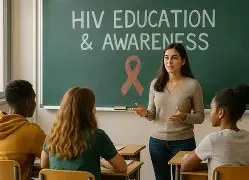
SEMSTER 1:
Introduction to HIV/AIDS: History, global trends, and epidemiology
Biology of HIV: Structure, replication, and impact on the immune system
Modes of Transmission & Prevention: Safe practices, education, and behavior change
Stigma & Discrimination: Social implications and human rights
Semester 2:
Antiretroviral Therapy (ART) & HIV Management: Drug therapy, adherence, and resistance
HIV & Co-Infections: TB, Hepatitis, and other opportunistic infections
Counseling & Psychosocial Support: Techniques, HIV testing, and emotional care
Research & Policy Development: Legal frameworks and ethical concerns
Practical Attachment (3–4 months):
Work with HIV clinics, NGOs, or community programs
Month 1–2:
Fundamentals of HIV/AIDS: History, biology, and transmission
Prevention & Treatment: ART, risk reduction, and testing methods
Month 3–4:
Social & Cultural Impact: Gender dynamics, stigma, and workplace policies
HIV/AIDS & Mental Health: Coping mechanisms and community support
Month 5–6:
Practical Exposure & Field Work: HIV counseling and outreach programs
This section focuses on hands-on experience for learners in healthcare, research, or social work:
Clinical Attachment (2 Month): Work in HIV testing centers and ART clinics
Community Outreach (1 Month): Conduct educational workshops and advocacy campaigns
Counseling & Support Services (1 Month): Engage in psychosocial care and peer counseling